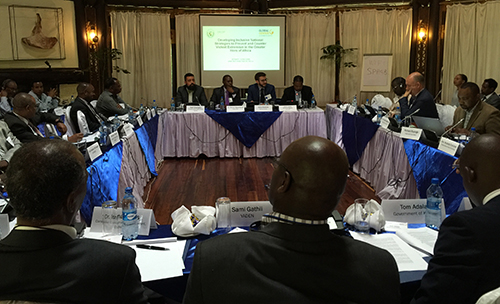 30th March 2016, Nairobi- The Intergovernmental Authority on Development (IGAD) Security Sector Program (SSP) in partnership with the Global Center on Cooperative Security kicked off a three days workshop on “Developing Inclusive national Strategies to Prevent and Counter Violent Extremism in the Greater Horn of Africa”.
30th March 2016, Nairobi- The Intergovernmental Authority on Development (IGAD) Security Sector Program (SSP) in partnership with the Global Center on Cooperative Security kicked off a three days workshop on “Developing Inclusive national Strategies to Prevent and Counter Violent Extremism in the Greater Horn of Africa”.
The threats of terrorism and violent extremism in the Greater Horn of Africa have been long-standing concerns for local, regional, and international actors. The relationship between the structural conditions and the opportunities they create for violent extremist recruitment underscores the critical need to address “conditions conducive” to the spread of terrorism and to develop preventive capacities to strengthen resilience at the local, national, and regional levels. The December 2015 UN Secretary-General’s “Plan of Action to Prevent Violent Extremism” encourages states to develop national plans of action to prevent violent extremism that set national priorities for addressing the local drivers of violent extremism. There exists a growing consensus that national P/CVE strategies can be vital tools in identifying national P/CVE priorities, securing necessary political commitment, and institutionalizing pathways of collaboration between government and civil society actors engaged in P/CVE. Additionally, they can serve to enhance national, regional, and international cooperation and foster collaborative approaches to counter the transnational threat of terrorism and violent extremism.
IGAD SSP represented by its Director, Commander Abebe Muluneh, the Head of CT & CVE pillar, Dr. Simon Nyambura, and the Program Officer, Mrs. Nejat A. Issa, who are engaged in CVE issues actively, are chairing and facilitating this timely meeting. Commander Abebe, in his opening remark, emphasized the need to address conditions conducive to and structural context of violent Extremism. He also stated that “in developing national plan and strategies, states should consider addressing the elements like dialogue and conflict prevention, strengthening good governance, human rights and the rule of law, engaging CSOs, religious and tribal leaders, empowering youth, gender equality and empowering women, education, skills development and employment facilitation, strategic communications, and the Internet and social media”. High level delegates from the IGAD Member States plus Tanzania, and Civil Service Organizations (CSOs) from the Region, are in attendance. The three days meeting is expected to build on discussions and sharing of experiences on the following topics:
• Drivers and Enablers of Violent Extremism
• Key Elements and Objectives of P/CVE Interventions and Programming
• Examining Roles of Various Stakeholders in Identifying, Preventing, and CounteringViolent Extremism
• The Role of National P/CVE Strategies
• Identifying Key Elements and Priorities of National P/CVE Strategies
• Developing Inclusive National P/CVE Strategies
• Challenges and Capacity Gaps in Developing National P/CVE Strategies
By identifying the priority areas for national P/CVE strategies and the key actors to support and engage these strategies, the outcome of the workshop discussions will develop hypothetical structures and processes for government and CSOs to design and implement inclusive national P/CVE strategies in the Greater Horn of Africa. Supporting development of national strategies will be one of the activities to be implemented by the Horn and Eastern African Counter Violent Extremism Center of Excellence and Counter-Messaging Hub.
(END)
